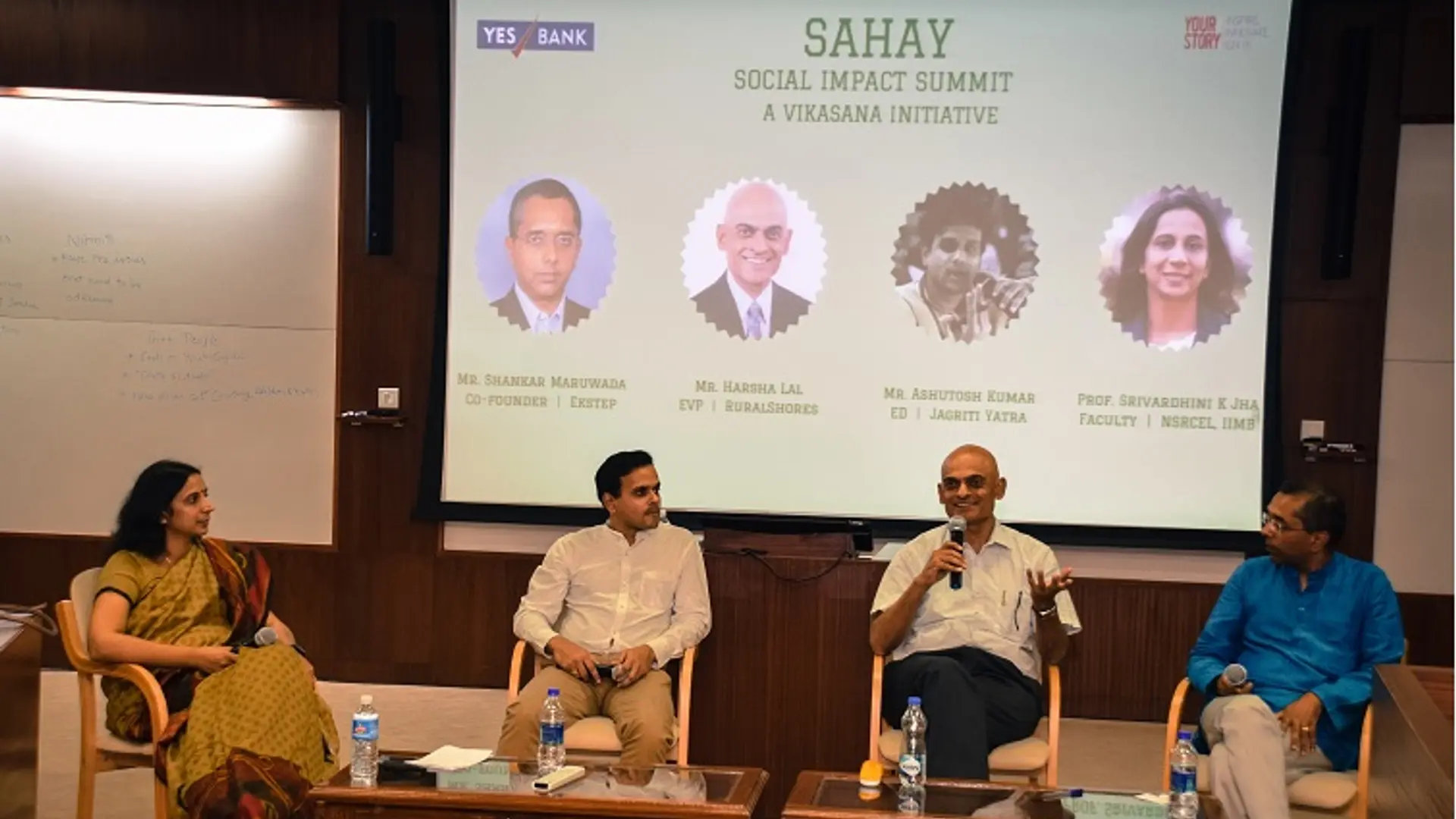Sustainability and scaling up – Is it possible?
The challenge with India’s social enterprise and non-profit ecosystem is that there’s no Silicon Valley to look up to yet. As organisations – big or small – continue to innovate, they become trailblazers. In such a scenario, it’s only valid that we continue to seek answers based on others’ experiences. At IIM-Bangalore’s social impact summit SAHAY, which aims connect entrepreneurs to capture synergies among complimentary ventures, the key discussion was Can sustainability and scaling up go hand-in-hand? The panel discussion hosted three eminent social entrepreneurs – Shankar Maruwada (Co-founder of EkStep), Ashutosh Kumar (Executive Director of Jagriti Yatra), and Harsha Lal (EVP of RuralShores).

The inherent conflict and the need to balance
The underlying assumption is that an entrepreneur doing social good would ideally not focus on profits. But as Shankar argues, “Social sector shouldn’t be viewed with a different lens from a regular business. While the objective isn’t profit, one needs to understand that sustainability isn’t possible without a value creation – either economic or social.” As Harsha rightly adds,
We give all benefits such as PF, medical insurance like any other corporate does. Just because a rural employee is unaware of these doesn’t mean that they should be excluded from it. We cannot provide a lifestyle, but we must aim to provide a livelihood. This is why there shouldn’t be a conflict between sustainability and scaling up – in fact, both should be a crucial part built within the model.
Jagriti Yatra’s revenue model acts as a great example. It has close to 500 yatris (participants) every year. Over a 15-day train journey, they are exposed to role models who are building India through enterprise with a belief that the inspiration derived will help a yatri undertake his/her own entrepreneurial journey. However, with the cost of participation being close to Rs 50,000, it excludes many deserving candidates – which hampers both sustainability as well as scaling up. Ashutosh recollects,
We decided to build a customer base and we started tapping into corporates such as Microsoft, Google, Coca-Cola, which are undertaking massive efforts to penetrate deep into the villages. They end up becoming our sponsors or secondary customers. The profits we generate enables us to give quality participants a chance as well as accelerate the entire programme.
For instance, Coca-Cola Company’s 5by20 initiative engages with women entrepreneurs by providing them business tools to encourage sustainable development. In a partnership with Jagriti Yatra, they accrue the best practices through the yatris and share it among the right set of people.
What are the challenges of scaling up?
1. Finance and social mindsets
Challenges are a plenty. But it’s the attitude with which they are approached that makes the difference. For RuralShores, a rural BPO, the main challenge has been social ideologies. In rural areas, there are many pre-set ideas – such as not allowing girl children to work late evenings or night shifts – around which they have had to work. On the other hand, training employees with basic skills, such as office etiquettes, e-mail writing, how to behave in a professional environment, means double the time as well as the cost – all of which while built in to the model becomes difficult to convince a corporate. To tackle this, RuralShores promotes people internally incentivising them to stay and reap the benefits of the efforts they have put in.
2. Mindset to scale
How can we put scale in to the plan from the very beginning? Should we or should we not? How will it be possible? The biggest barrier to all these questions is the mindset. Shankar gives three valuable tips:
- Leverage existing infrastructure and networks – It’s essential to first understand the lacunae in the existing system and analyse the strengths a new intervention can bring, which can be adopted by current players as well.
- Never assume – In the late 1990s, the social sector was debating on building toilets over technologies for mobile, assuming that people would invest in basic sanitation over a mobile, which was an apparent luxury. But today, India has over 200 million mobile handsets and people are now leveraging this to innovatively solve social issues.
- Simplicity and focus – As Shankar recalls his experience with Aadhaar, “From the beginning, we focussed on delivering only two things – first is a 12-digit identification number and second is authenticating a profile with a simple ‘yes’ or ‘no’. We were sure that others would build on top of this and they have.”
3. Attracting and retaining the right talent
If an organisation is able to rally committed people, then half the job is done. But the biggest challenge we face today is that the top-notch talent from premier institutes are selling cigarettes and fairness creams, which are available in every shop across the nation. There is a need to reverse this parameter. The very same people should focus on bringing safe drinking water to every citizen. To this end, incentivising them in the right manner becomes imperative.
It is clear that there are challenges. But it is also clear that sustainability and scaling up must go together, else the very purpose of social good gets defeated. So get it right and for that build a strategy. Then put it down in a microcosm and create one unit of what you would ideally like to build upon. As Harsha says,
Understand if that one unit is profitable or not. Can it sustain on its own and if yes, how long will it take for you to reach there? Is it delivering social impact or not? Once the answers are in your favour, you are already on your way to scaling up sustainably.







